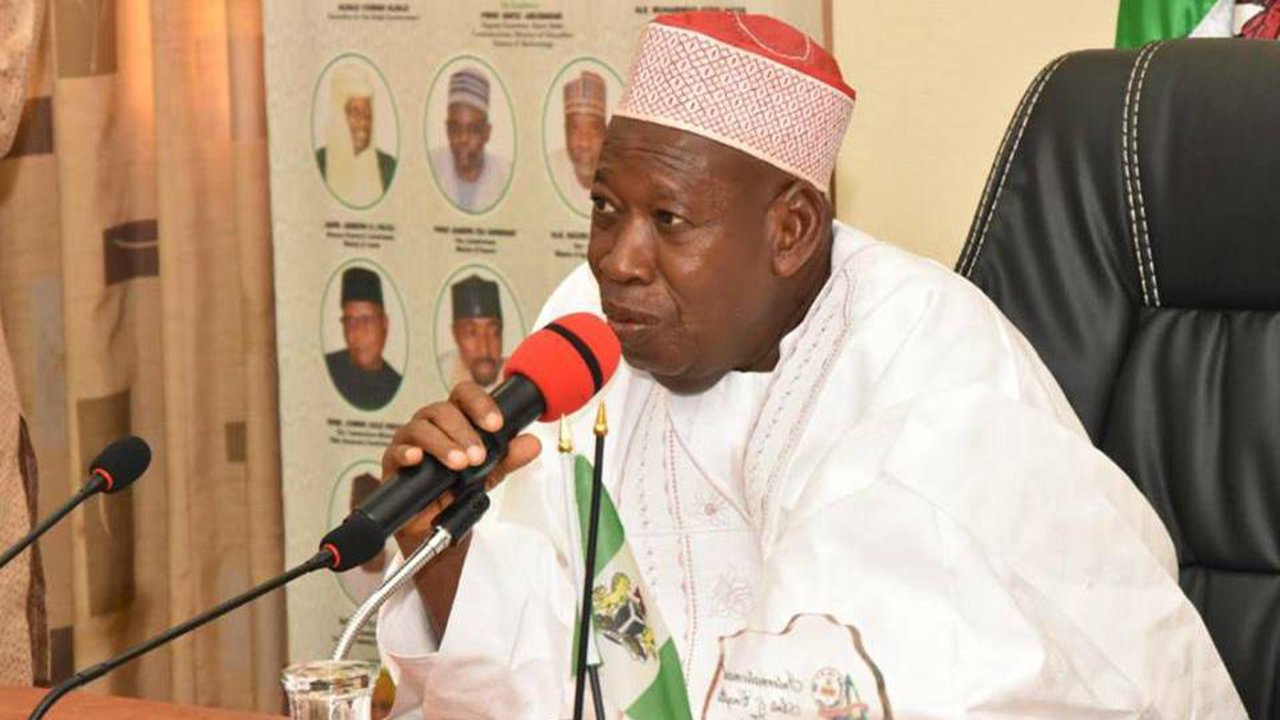Mixed reactions trail lockdown relaxation in Kano
Following the total lockdown imposed on Kano by President Muhammadu Buhari on April 27, 2020 to curb the spread of the COVID-19 pandemic in the state, the state government found it essential to relax the order for two days weekly to allow the residents purchase basic necessities. Governor Abdullahi Umar Ganduje, who announced this during […]

Kano Governor, Abdullahi Ganduje.
Following the total lockdown imposed on Kano by President Muhammadu Buhari on April 27, 2020 to curb the spread of the COVID-19 pandemic in the state, the state government found it essential to relax the order for two days weekly to allow the residents purchase basic necessities.
Governor Abdullahi Umar Ganduje, who announced this during a media briefing of the State Task Force on COVID-19, said the easing of the lockdown order was with the consent of the president.
The governor said, “People must observe all protocols as given by our health professionals. We should all know that there is no shortcut in the fight against COVID-19 all over the world. So we must always abide by all the protocols.”
Ganduje explained that within the time for the relaxation of the lockdown, all markets must remain closed with the exception of Yankaba market, where perishable items are sold and Yan Lemo market, where fruits are sold as well as some selected stores and supermarkets.
However, while only two major markets were allowed to fully operate during the relaxation, Chronicle observed that some traders used the opportunity to defy the order by conducting trading at different parts of the metropolis.
For instance, at the popular Kantin Kwari textile market on Monday, traders took over and converted major roads leading into the market to display their goods.
It was gathered that the traders, early in the day, maneuvered their way into the market to move out their goods to the roadside for a display to prospective buyers.
They displayed their goods along major roads around Fagge, Wapa Cinema, Yakasai, behind Radio Kano, IBB Way and Ibrahim Taiwo Road, which led to serious over-crowding by buyers, thereby breaching the protocol aimed at preventing the spread of the new virus.
The relaxation was, however, seen from different perspectives in different quarters.
While some believed it was a dangerous move that could cause massive community transmission of the virus, others saw it as an opportunity to call for the opening of places of worship.
Reacting to those against the relaxation at the launching of the distribution of face masks in the eight local government areas of the metropolis on Monday, Governor Ganduje said those critics did not know anything about Kano and the social setup of the state.
“Kano is a megacity and is a complex society that is bigger than many states in the country. It shares the same characteristics with other megacities of the world and needs to be treated as such.”
He added that he was relaxing the lockdown to remedy the tension associated with its implementation.
Among those calling for the opening of places of warship, Dr Abdallah Usman Gadon Kaya, a renowned Islamic scholar, said if there was the chance to relax the lockdown on some days for what was considered a necessity, the government should also consider Friday congregational prayers as a necessity for the people to pray to God to wipe out the pandemic.
“We are pleading to the authorities concerned and all those who have a say in that decision to consider the massive deaths recorded in Kano recently and allow us to return to Allah and beseech His intervention in this time of tribulation,” he said.
He was of the opinion that if the lockdown could be relaxed for several hours in two days of the week for people to go to markets, there is no rationale behind the suspension of Friday prayers that last not more than 30 minutes.
For Malam Halilu Rabe, a yam seller, the relaxation was a lifeline for him and his family. “Many of us could have died at home by now, not due to coronavirus but hunger and frustration. But with the relaxation, we thank Allah Who provides for us, especially with the blessings of the month of Ramadan, we were able to get what to feed our families,” he said.
Meanwhile, after the elapse of the presidential lockdown order, the state announced an extension of the restriction by one week.
The Commissioner for Information, Malam Muhammad Garba, who made the announcement, said the decision was reached after due consultations with the federal government and key stakeholders in the health sector.
The Chairman Nigerian Medical Association, Kano State chapter, Dr Sanusi Bala Muhammad, said the lockdown was one of the measures proven to be effective in curbing the spread as seen in China and other parts of the world.
“There are basically three options; first, if the government could afford to provide residents with their basic needs, then total lockdown is the best thing to do. If that could not be achieved, then there should not be central markets where a large number of people will gather, as that will bring about transmission from one community to another.
“Therefore, goods could be supplied from such central markets to community markets, if there are any. But if there are none, then the last option is to ease the lockdown and allow people to go to the markets as it obtains currently and that will not help in flattening the curve, people will continue to transmit among themselves until we reach the herd immunity where some 70, 80 percent of people are infected then the transmission will naturally die down,” he explained.
